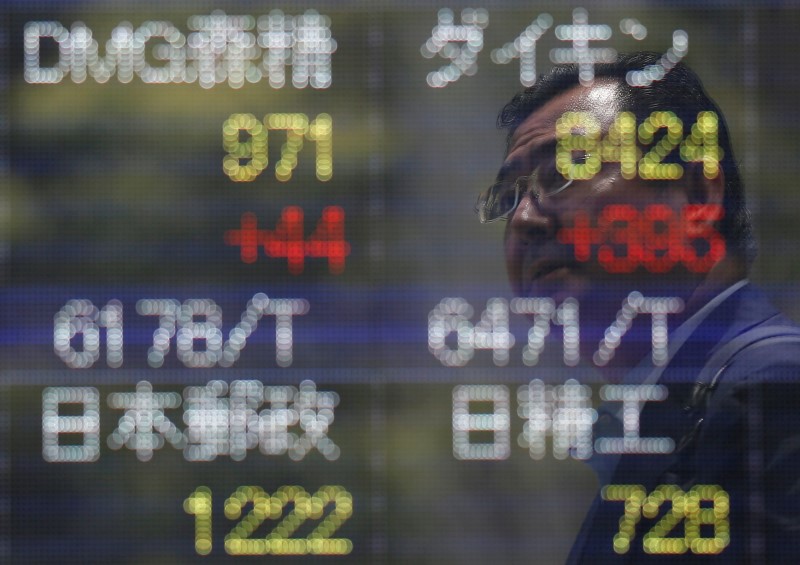By Hideyuki Sano and Tomo Uetake
TOKYO (Reuters) - The Bank of Japan's near doubling of its purchases of Tokyo shares is causing investors to worry the central bank will dominate financial markets, which could lead to price distortions as it continues to grease the economy.
The BOJ's buying spree will make it harder for investors to sift good companies from bad, and raises a host of other problems including misallocating capital, making equities trading more speculative and reducing incentives for companies to meet shareholder needs, analysts say.
More than three years of massive monetary stimulus has already resulted in the central bank cornering the Japanese government bond (JGB) market and distorting interest rates.
"The increased BOJ purchasing provides a very favorable demand environment for listed equities," said Michael Kretschmer, chief investment officer at Pelargos Capital in the Hague. "Nevertheless, in the long run we strongly doubt these type of monetary gimmicks aimed at price setting of risk assets can have a sustained positive impact on economic growth."
The BOJ doesn't dominate the stock market as it does JGBs, but its revved up buying of index-based shares has shifted attention to the central bank's behavior and away from how companies perform.
That's contributed to outsized gains for stocks such as Fast Retailing Co (T:9983), Uniqlo's brand owner, which features prominently in the Nikkei share average (N225).
Some liken the increased purchases by the BOJ - the only central bank in the world that buys stocks at the moment - to failed government efforts over more than two decades to prop up the market by pressing government-related financial institutions to buy after the bursting of the late-1980s asset bubble.
The BOJ has sought to boost economic activity and dispel decades of deflation by flooding the system with cash through massive asset purchases. These have been mostly JGBs, but have included real-estate investment trusts, corporate bonds, commercial paper and stocks, in the form of exchange-traded funds, or ETFs.
The BOJ decided on July 29 to expand this stimulus by increasing its annual purchases of ETFs to 6 trillion yen ($60 billion) from 3.3 trillion yen.
With foreign investors largely staying away, disappointed at the lack of progress in Japan's structural reforms, the BOJ is almost sure to be the biggest buyer on the Tokyo Stock Exchange for the foreseeable future.
"The market is driven completely by the BOJ's buying rather than views on each companies' earnings," said a fund manager at a Japanese asset management firm.
JGB-IFICATION
Some worry the stock market could start to resemble the bond market, where the BOJ's purchases - about 110-120 trillion yen annually - have made traders fixate on its bond buying and pay scant attention to economic data.
The BOJ's tactics "could weaken the market's function in the long run," said Keita Matsumoto, head of investor sales at Citigroup (NYSE:C) Global Markets Japan. "I'm worried that could lead to a 'JGB-ification' of stocks."
BOJ Governor Haruhiko Kuroda insists increased buying isn't intended to boost share prices and wouldn't warp the market.
The BOJ's buying, although broad-based, benefits some shares over others.
Analysts estimate the central bank allocates about 60 percent of its buying in ETFs that track the Nikkei, 30 percent to the broader Topix (TOPX) and the rest to the new JPX 400 (JPXNK400). That reflects the size of available ETFs but disproportionately benefits the 225 companies in the Nikkei over the nearly 2,000 companies listed in the Topix.
The Nikkei and Topix should roughly track each other, but the Nikkei has risen 0.7 percent while the Topix has fallen 0.3 percent since the BOJ's announcement.
Moreover, the Nikkei is a simple average, not weighted by market capitalization, as the Topix is. That means a handful of high-priced shares that have outsized weightings in the Nikkei benefit the most.
Fast Retailing, which accounts for more than 8 percent of the Nikkei, has risen 12.4 percent since the BOJ's decision. Softbank Group Corp (T:9984), another heavyweight, has jumped 21.0 percent, even as the tech and investment firm's profit outlook has hardly changed.

"The rise in share prices may seem desirable but it causes harm as well," said Shingo Ide, chief equity strategist at NLI Research Institute. "Even if companies need to improve their management, shareholders may not take them seriously if share prices are not falling."